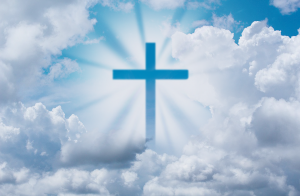
Shownotes
Welcome to Day 1571 of our Wisdom-Trek, and thank you for joining me.
I am Guthrie Chamberlain, Your Guide to Wisdom
The Cloud Rider – Worldview Wednesday
Welcome to Wisdom-Trek with Gramps! Wisdom is the final frontier in gaining true knowledge. Our mission is to create a legacy of wisdom, seek out discernment and insights, and boldly grow where few have chosen to grow before. Hello, my friend; this is Gramps; thanks for coming along on our journey to increase Wisdom and Create a Living Legacy. Today is Day 1571 of our Trek, and it is Worldview Wednesday. Creating a Biblical Worldview is essential to have a proper perspective on today’s current events. To establish a Biblical Worldview, you must have a proper understanding of God and His Word. This week, we will continue reviewing the book from Dr. Michael S Heiser titled “Supernatural.” The book is an abbreviated version of his more comprehensive book, “The Unseen Realm.” I highly recommend both of these books. Creating a Biblical Worldview based on how the Old and New Testaments connect with God’s overall plan for humanity is essential. This book review will help us understand what the Bible teaches about the unseen world, and why it matters.
The Cloud Rider
We closed the last chapter by noting how Jesus began to talk about his death immediately after baiting the powers of darkness at the gates of hell and Mount Hermon. The challenge set in motion a string of events that would lead to the Lord’s trial and his death on the cross. Christians have read about the trial of Jesus many times. But there’s a supernatural backdrop to it that is frequently overlooked.
To understand what finally draws the death sentence from the Jewish authorities and the transfer of Jesus to Pontius Pilate to carry it out, we have to go back to the Old Testament book of Daniel—to a meeting God holds with his heavenly host, his divine council.
The Ancient of Days and His Council
Daniel 7 begins with a strange vision. Daniel sees four beasts coming out of the sea (Daniel 7:1–8). They’re all freakish, but the fourth beast is the worst. In the dreams interpreted in the Old Testament, both objects and living things always represent something, and in this dream, the four beasts in Daniel’s vision are four empires. We know that because his vision aligns with the themes of Nebuchadnezzar’s dream in Daniel 2, which was about Babylon and three other empires to follow. Our focus, though, is on what Daniel describes next in Daniel 7:9-10:
I watched as thrones were put in place
and the Ancient One sat down to judge.
His clothing was as white as snow,
his hair like purest wool.
He sat on a fiery throne
with wheels of blazing fire,
and a river of fire was pouring out,
flowing from his presence.
Millions of angels ministered to him;
many millions stood to attend him.
Then the court began its session,
and the books were opened.
We know the Ancient of Days is the God of Israel. That’s pretty easy to determine, especially if we compare his throne’s description to Ezekiel’s vision of God’s throne (Ezekiel 1). The fire, wheels, and human form on the throne in that vision are the same as Daniel’s.
But did you notice there isn’t just one throne? There are many thrones in Daniel’s vision (Daniel 7:9)—enough for the divine court, God’s council (Daniel 7:10). The heavenly court meets to decide the fate of the beasts—the empires—in the vision.
It is decided that the fourth beast must be killed and the other beasts rendered powerless (Daniel 7:11–12). Another king and kingdom will displace them. And that’s where things get even more interesting.
The Son of Man Who Comes on the Clouds

Daniel continues narrating his vision in Daniel 7:13-14:
As my vision continued that night, I saw someone like a Son of Man coming with the clouds of heaven. He approached the Ancient One and was led into his presence. He was given authority, honor, and sovereignty over all the nations of the world, so that people of every race and nation and language would obey him. His rule is eternal—it will never end. His kingdom will never be destroyed.
“Son of Man” is a phrase used many times in the Old Testament. It should be no surprise that it speaks of a human. The surprise is how else this human is described in this passage. Daniel 7:13 describes a man coming with the clouds to the Ancient of Days.
Why is that a big deal? Because everywhere else that description occurs in the Old Testament, it was used only of God himself (Isaiah 19:1; Deuteronomy 33:26; Psalm 68:32–33; Psalm 104:1–4). But in Daniel 7, God was already in the scene as the Ancient of Days. It’s as if, in his vision, Daniel sees a “second God” who is also a man—something like the way Christians believe in God as more than one person.
That’s precisely the point.
As Jesus stood before Caiaphas at his trial in Matthew 26:59-66, his life hanging in the balance, he hit a nerve by appealing to this idea:
Inside, the leading priests and the entire high council were trying to find witnesses who would lie about Jesus, so they could put him to death. But even though they found many who agreed to give false witness, they could not use anyone’s testimony. Finally, two men came forward who declared, “This man said, ‘I am able to destroy the Temple of God and rebuild it in three days.’”
Then the high priest stood up and said to Jesus, “Well, aren’t you going to answer these charges? What do you have to say for yourself?” But Jesus remained silent. Then the high priest said to him, “I demand in the name of the living God—tell us if you are the Messiah, the Son of God.”
Jesus replied, “You have said it. And in the future you will see the Son of Man seated in the place of power at God’s right hand and coming on the clouds of heaven.”
Then the high priest tore his clothing to show his horror and said, “Blasphemy! Why do we need other witnesses? You have all heard his blasphemy. What is your verdict?” “Guilty!” they shouted. “He deserves to die!”
In what seems like a pointless answer to a straightforward question, Jesus quoted Daniel 7:13 in response to Caiaphas. Do you want to really know who I am, Caiaphas? Listen carefully. The reaction is immediate. Caiaphas understood in an instant that Jesus was claiming to be the second God figure of Daniel 7:13—the human who was described in a way only God was described in the Old Testament. He was claiming to be God in human form. That was blasphemy—and grounds for a death sentence.
But Jesus, of course, knew that. He had no interest in protecting himself. He knew he must die to restore God’s kingdom, bring believers into God’s family, and reclaim the nations from the evil principalities and powers who controlled the nations God rejected at Babel.
And die he did. Psalm 22, well-known for how it describes the physical effects of crucifixion through David’s words, gives us a glimpse of horrors unseen at the cross. The suffering psalmist moans in Psalm 22:7-14:
Everyone who sees me mocks me.
They sneer and shake their heads, saying,
“Is this the one who relies on the Lord?
Then let the Lord save him!
If the Lord loves him so much,
let the Lord rescue him!”
Yet you brought me safely from my mother’s womb
and led me to trust you at my mother’s breast.
I was thrust into your arms at my birth.
You have been my God from the moment I was born.
Do not stay so far from me,
for trouble is near,
and no one else can help me.
My enemies surround me like a herd of bulls;
fierce bulls of Bashan have hemmed me in!
Like lions they open their jaws against me,
roaring and tearing into their prey.
My life is poured out like water,
and all my bones are out of joint.
My heart is like wax,
melting within me.
The creepy part of this description is the fierce bulls from Bashan. As we noted earlier, in Old Testament times, Bashan was ground zero to demonic gods and the realm of the dead. The area was a leading center for the worship of Baal, symbolized by bulls and cows. “Bulls from the land of Bashan” is a reference to demons, the powers of darkness. In our own time, the imagery was captured in all its eerie repulsion by C. S. Lewis in The Lion, the Witch, and the Wardrobe. No one who has read that book or seen the movie can forget Aslan humbly surrendering his life to the delighted hordes of the White Witch on the Stone Table.
And just as Jesus had utterly outwitted Satan, Aslan had played the White Witch for a fool. What evil misperceived as the moment of triumph turned out to be its own irreversible defeat.
You Are Gods, but You Will Die Like Men

Satan’s loss of his claim over the lives of Adam’s children was not the only loss he suffered at the cross. His cohorts in rebellion, the supernatural gods (elohim) of the nations, would see their domains begin to vanish.
The supernatural gods had been assigned those nations by the Most High, the God of Israel (Deuteronomy 4:19–20; 32:8–9). We are not told when they became enemies of God, but they did. They had turned God’s own people, Israel, away from worshipping him to instead sacrifice to them (Deuteronomy 17:1–3; 29:26–27; 32:17). Psalm 82, the psalm we looked at in chapter 2 to introduce the divine council, tells us these elohim abused their power and rewarded evil. They have no care for God’s law or justice in Psalm 82:1-5:
God presides in the heavenly council;
In the assembly of the gods (elohim), he gives his decision:
“You must stop judging unjustly;
you must no longer be partial to the wicked!
Defend the rights of the poor and the orphans;
be fair to the needy and the helpless.
Rescue them from the power of evil people.
“How ignorant you are! How stupid!
You are completely corrupt,
and justice has disappeared from the world.”
The rest of the psalm tells us God had called this heavenly council meeting to tell the gods their future was bleak. Their reigns of terror would end when God decided to reclaim the nations in Psalm 82:6-8:
“ ‘You are gods,’ I said;
‘all of you are children of the Most High.’
But you will die like mortals;
your life will end like that of any prince.”
Come, O God, and rule the world;
all the nations are yours.”
When would God decide to reclaim the nations? We read the answer earlier in Daniel 7:14:
He was given authority, honor, and royal power, so that the people of all nations, races, and languages would serve him. His authority would last forever, and his kingdom would never end.
The messaging of Daniel 7:13–14 is clear—when the Son of Man receives the kingdom, it will be the beginning of the end for the supernatural powers of darkness. Jesus received the kingdom at his resurrection. Ephesians 1:20–21 God “raised Christ from death and seated him at his right side in the heavenly world. Christ rules there above all heavenly rulers, authorities, powers, and lords; he has a title superior to all titles of authority in this world and in the next”
Why This Matters
Before the cross, Satan had an eternal claim on our souls. All humans die—and so, go to the realm of the dead, his domain. There we would remain—were it not for the sacrifice of Jesus and his resurrection. Through faith in his work on the cross, we are raised with him. As we saw in the previous chapter, Satan was expelled from God’s presence when the kingdom began on earth (Luke 10:18). God would have no more of his accusations against believers. He had no more right to our souls.
Why, then, do we live as though he does? Salvation is not gained by moral perfection. It is a gift that comes by grace, through faith (Ephesian 2:8–9). That, in turn, means salvation cannot be lost by moral imperfection. What is not at all gained by performance cannot be lost by poor performance. Salvation is about believing loyalty—trusting what Jesus did to defeat Satan’s claim and turning from all other gods and the belief systems of which they are a part.
That is God’s kingdom’s message we are commissioned to tell to the nations (Matthew 28:19–20). And as we obey, the dominions of the enemy gods, the principalities and powers, shrink—soul by soul, moment by moment. The gates of hell, the realm of the dead, do not withstand the resurrection, and will not withstand the advance of the gospel.
At the time of Jesus’ crucifixion, though, none of this seemed real to the disciples. But they would soon get the message in a dramatic, unforgettable way.[1]
That will finish our study for this week’s worldview Wednesday. Join us again next week as we continue with the next chapter in Supernatural in our quest to build our Biblical Worldview. Tomorrow we will ponder another bit of wisdom from Gramps. So encourage your friends and family to join us and then come along with us tomorrow for another day of ‘Wisdom-Trek, Creating a Legacy.’

If you would like to listen to any of our past 1570 treks or read the Wisdom Journal, they are available at Wisdom-Trek.com. I encourage you to subscribe to Wisdom-Trek on your favorite podcast player so that each day’s trek will be downloaded automatically.
Thank you so much for allowing me to be your guide, mentor, and, most of all, your friend as I serve you through this Wisdom-Trek podcast and journal.
As we take this Trek together, let us always:
- Live Abundantly (Fully)
- Love Unconditionally
- Listen Intentionally
- Learn Continuously
- Lend to others Generously
- Lead with Integrity
- Leave a Living Legacy Each Day
I am Guthrie Chamberlain….reminding you to ’Keep Moving Forward,’ ‘Enjoy your Journey,’ and ‘Create a Great Day…Everyday’! See you Tomorrow!
[1] Heiser, M. S. (2015). Supernatural: What the Bible Teaches about the Unseen World—And Why It Matters. (D. Lambert, Ed.) (pp. 117–125). Bellingham, WA: Lexham Press.